John M. Roushey of Warminster, PA, as Harry S. Truman (1884-1972), relaxes before his talk.
Decked
out in a gray toupee, double-breasted suit, colorful bow-tie, and signature
round eyeglasses, John M. Roushey portrayed Harry S. Truman, 33rd
president of the United States, before a spellbound audience of 46 in the Upper
Moreland Township Room on March 26, hosted by the Upper Moreland Historical
Society.
Roushey
is lucky to be alive. Three years ago he was in very poor health, putting his presentations on hold.
Truman
is one of many. His performances include Ben Franklin, John Wanamaker, James
Buchanan, and William Tennent.
Tennent was the pastor of the Neshaminy Warwick Presbyterian Church in the early 1700's, and founder of a school to train pastors called the "Log College," a precursor of Princeton Seminary.
He's also the founder of Warminster, PA, where Roushey has lived for 55 years.
Tennent was the pastor of the Neshaminy Warwick Presbyterian Church in the early 1700's, and founder of a school to train pastors called the "Log College," a precursor of Princeton Seminary.
He's also the founder of Warminster, PA, where Roushey has lived for 55 years.
With
the help of cardio rehab and his three children, “who take good care of me,”
the 79-year-old Roushey is back in the saddle again. A retired mechanical
engineer, he performs with such vigor he doesn’t need a microphone.
As
Truman, he strode before the audience of 46 cracking jokes – “Wake up! You must
be a Republican” – that had the audience roaring with laughter.
“Being
president is no walk in the park,” said Roushey, or, rather, Truman, who had
served as a two-term senator from Missouri,
when Franklin Roosevelt tapped him to be his running mate.
Roosevelt took notice of
Truman when he headed what became known as “Truman’s Committee.” During World
War II, he looked into spending for the war effort and discovered massive waste
and corruption that saved the taxpayers billions of dollars.
But
Truman became one “shook-up person,” he said, when Roosevelt
died in April of 1945.
“I’d
only been vice president for four months when Roosevelt died in Warm Springs, GA.”
FDR was 63.
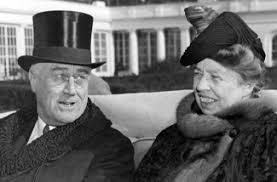
“Eleanor
Roosevelt summoned me to her office in the White House.”
“Harry,”
she said, “the president is dead.”
“Eleanor,
is there anything we can do to help you?”
“Harry,”
she replied, “is there anything we can do to help you? You’re the one in trouble now, Harry!”
Indeed
he was. “I felt like the sun, the moon and all the planets had fallen on me.”
Shockingly,
Truman had had only three very brief meetings with the former president. He knew
nothing about the development of the atomic bomb.
As
the war was wrapping up, Truman flew to Pottsdam,
Germany, to attend the now-famous Pottsdam Conference with leaders Winston
Churchill and Joseph Stalin.
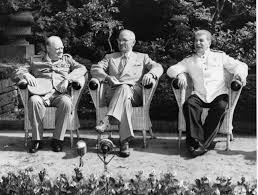
“When
Churchill heard that Roosevelt ‘the Eagle’ was
dead, he said, ‘Now I’ll have to deal with ‘the Sparrow.’”
At
Pottsdam, Truman met with Stalin for the first time. “He was an arrogant son of
a….” he told the audience. His salty language, which he learned on the family farm
and in the National Guard, where he rose to Major in WWI, had been tempered by his wife Bess.
At
Pottsdam, Truman learned that “the baby had been born.” The baby was the atomic
bomb.
The final decision to use the bomb became Truman's to make. Clement Atlee, who defeated Churchill and took his place at Pottsdam - “a stuffed shirt” – was against it, but Stalin was all for it.
The final decision to use the bomb became Truman's to make. Clement Atlee, who defeated Churchill and took his place at Pottsdam - “a stuffed shirt” – was against it, but Stalin was all for it.
Truman
wrote his wife Bess that “the three leaders haggled like old women.”
Truman
always found himself in the center of controversies, such as whether or not to
drop the bomb. His guiding principle, he told the audience, were the 35 words
of the American Constitution, summed up in the words “I will preserve, protect
and defend the Constitution of the United States.”
“That’s
all it is,” he said. “Thirty-five words that would change the life of everyone who took that oath of office."
The
Japanese were voracious fighters who refused to surrender. “We sent memos to
the High Command telling them if they didn’t surrender, we would unleash a
weapon of destruction such as they had never seen. We also dropped leaflets
into the major cities, warning them of imminent destruction.”
In
early August of 1945, the first bomb exploded over Hiroshima. Three days passed, no word of
surrender, and then the second bomb exploded over Nagasaki.
Both cities were dedicated to war production.
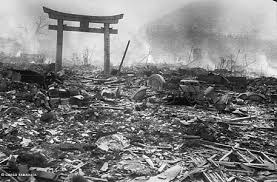
“Nobody
knew they were the only two bombs we had,” said Truman.
Five
days later the Japanese surrendered. The terrible war was over.
“I’m
convinced,” said Truman, “we saved the lives of millions of people.”
“The buck stops here,” read a sign in Truman’s
office.
What
people don’t know, said Roushey, is that the term derived from playing poker, a
favorite of Truman. The buck stopped with the dealer.
The
war, which America
entered in 1941, put an end to the Great Depression. “By God, I was not going
to allow us to get into another one when the servicemen came home. I worked on
‘The New Deal’ with great opposition from Congress.”
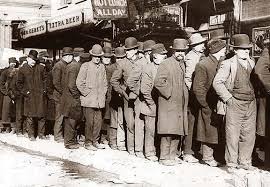
He
also met with tremendous opposition about the “Marshall Plan,” to help rebuild
war-torn Europe, including Germany.
Knowing he could never push the bill through a Congress that was hostile to him,
he relied on General George Marshall, his secretary of defense and esteemed
military leader, who did succeed in getting the bill passed.
The
Democratic Convention to choose a presidential candidate was held in 1948 right
here in Philadelphia.
“The
Democrats were in complete chaos,” said Truman. “I got the nomination at 11:30
pm.”
He
then took the campaign to the people. “We did a whistle stop tour with barely
any money, visiting 12 states. Thirty-one thousand miles and 350 speeches
later, we had done everything possible,” said Truman, walking back and forth
across the stage.
On
one of his stops, a man yelled out, “Give ‘em hell, Harry.” Truman, always fast
on the uptake, said, “I never gave anybody hell. I just tell the truth on the
Republicans, and they think they’re
in hell.”
Truman
was a health nut. “I walk two miles every day at the army pace of 120 steps per
minute. That kept the Secret Service boys and the newsmen on their toes.”
His
breakfast? Every morning he ate a bowl of oatmeal, two slices of whole wheat
toast and a glass of milk.
On
Election Night, Truman drank a glass of buttermilk and went to bed around 8 p.m.
He awoke around midnight to hear the radio announcer call the election for
Thomas Dewey, governor of New York.

Roushey
held up the now-famous Chicago Tribune headline reading “Dewey Defeats Truman.”
In fact, Truman handily won the Electoral Vote, but only 49 percent of the
popular vote.
John
Roushey tells a story about his naturalistic appearance as Truman. He went to
his optometrist to get a pair of Truman’s round eyeglasses. The optometrist
told him to look at Truman’s inauguration photo and adopt his attire.
The eye doctor fashioned Roushey a pair of round eyeglasses; Roushey ordered the double-breasted suits and bright bow-ties favored by the president. Roushey was a Mason and wore a Masonic ring, as did the president.
The eye doctor fashioned Roushey a pair of round eyeglasses; Roushey ordered the double-breasted suits and bright bow-ties favored by the president. Roushey was a Mason and wore a Masonic ring, as did the president.
The
conflict between North and South
Korea took everyone by surprise. “A lot of
people didn’t even know where Korea
was,” said Truman. “When the North Koreans crossed the 39th parallel
and invaded South Korea,
I knew that I had to act quickly,” he said.
Truman
sent men, ships and planes, and General Douglas MacArthur to defend South Korea.
And what did MacArthur do? “He disobeyed a direct order.
“I
had no choice but to remove the offending officer. That’s one time when I
wished an old soldier would just fade away,” he said. The Korean conflict had
been called a “police action.” Truman feared it would turn into another world
war, which is why it was necessary to fire his nemesis.
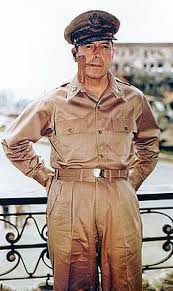
Truman
was proud of his accomplishments.
“I
was the first president to appear on television.

I remodeled the White House after [daughter] Margaret’s piano leg went through the floor.

I was the first president to recognize the NAACP and I recognized the sovereign state of Israel. My ‘Fair Deal’ programs, which included the expansion of Social Security, gave our servicemen jobs when they came home from the war.”
I remodeled the White House after [daughter] Margaret’s piano leg went through the floor.
I was the first president to recognize the NAACP and I recognized the sovereign state of Israel. My ‘Fair Deal’ programs, which included the expansion of Social Security, gave our servicemen jobs when they came home from the war.”
Facing
the audience, he said, “At heart, I’m a Missouri
farm boy who failed miserably in business. I learned that the government should
be run like a household. And Bess was the love of my life.”

He
was always saddened when she left the White House to return to their Independence, MO
homestead to get out of the political limelight. “If you want a friend in Washington,” she said,
“get a dog.”
At
home, Truman’s aged mother lived with them. Unlike most people, she wasn’t
afraid to “give him hell.”
Checking
the clock, Truman thanked the audience for its attentiveness.
“I
would ask one thing of you,” he said. “Hold your opinions of me until I’m out
of office for ten years. Then you can decide what you think of my
Presidency.”
John
Roushey is a die-hard Republican.
When audience member Irwin Schwartz of Huntingdon Valley was 11 years old, he went to downtown Philly to see President Truman. At 11th and Market he was surrounded by a crowd and asked a man, "Where is the President?"
"I am the President," said Truman.
Elaine Leibrandt, Vice President, Secretary & Programs, introduced the speaker.
Jack Houriet is in charge of the e-newsletter.
Joe
Thomas is president emeritus of the
Upper Moreland Historical Association. When audience member Irwin Schwartz of Huntingdon Valley was 11 years old, he went to downtown Philly to see President Truman. At 11th and Market he was surrounded by a crowd and asked a man, "Where is the President?"
"I am the President," said Truman.
Elaine Leibrandt, Vice President, Secretary & Programs, introduced the speaker.
Jack Houriet is in charge of the e-newsletter.
The Association has a museum in the Upper Moreland Township Building, 117 Park Ave. in Willow Grove across the street from the library. Joe presides over its thousands of artifacts, books, posters and other memorabiia on Thursdays from 11 a.m. until 3 p.m.









No comments:
Post a Comment